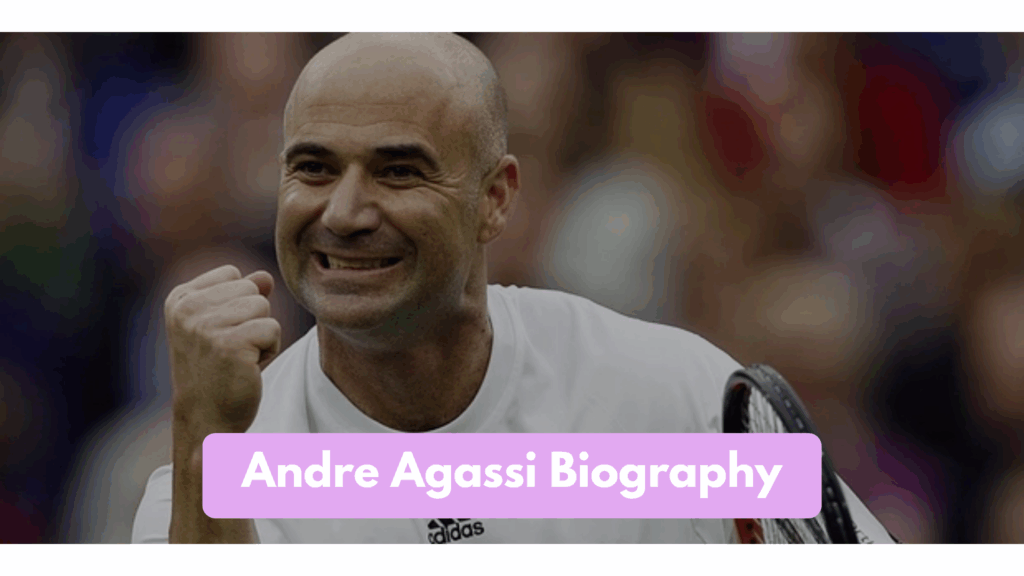Andre Agassi Biography: Grand slams, Height, Children, Age, Net Worth, Wife

Andre Agassi is one of the most recognizable and influential figures in modern tennis. Known for his explosive baseline game, trademark intensity, off-court honesty, and later-life reinvention as a philanthropist and teacher, Agassi’s life reads like a sports drama: early fame, rebellion, burnout, a powerful comeback, and a lasting legacy that extends well beyond trophies. This biography traces his life from Las Vegas kid to global icon and explains why his story still matters.
Early life and beginnings
Andre Kirk Agassi was born on April 29, 1970, in Las Vegas, Nevada. The son of Emmanuel “Mike” Agassi — an Olympic boxer originally from Iran — and Elizabeth (Betty) Agassi, Andre grew up in a sporting household where discipline and high expectations were part of daily life. He was enrolled in tennis training very young and by age 13 had been sent to Nick Bollettieri’s famed tennis academy in Bradenton, Florida — a move that accelerated his development and introduced him to the pro pathway.
Turning pro and teenage stardom
Agassi turned professional at age 16 in 1986, and he quickly became a media magnet — partly because of his long hair and rebellious style (including the infamous denim shorts at the U.S. Open) and partly because of prodigious talent. He broke into the top ranks during his teens and won his first top-level title in 1987. Early success marked him as a future Grand Slam contender but the spotlight also heightened the pressures that would follow him through his career.
Grand Slams, milestones, and playing style
Andre Agassi finished his career with 8 Grand Slam singles titles, and — importantly — completed the career Grand Slam (winning all four major tournaments at least once) when he won the 1999 French Open, a comeback victory after being two sets down. His Grand Slam victories span:
- Wimbledon — 1992 (beat Goran Ivanišević in a five-set final),
- US Open — 1994 (beat Michael Stich) and 1999 (beat Todd Martin in an epic final),
- Australian Open — 1995, 2000, 2001, 2003,
- French Open — 1999.
Agassi’s game was defined by an aggressive two-handed backhand, superb return of serve, and remarkable ability to control rallies from the baseline. Though he began as a polarizing, fashion-forward youth icon, his on-court intelligence and tactical adjustments under coaches like Brad Gilbert helped him sustain a long, elite-level career.
Rivalries and defining matches
Agassi’s rivalry with Pete Sampras dominated the 1990s, producing some of tennis’s most-watched matches and a contrast in styles — Sampras’s serve-and-volley versus Agassi’s baseline artistry. Their matches were cultural moments and helped lift tennis’s global profile. Beyond Sampras, Agassi had memorable duels with players such as Jim Courier, Michael Chang, Goran Ivanišević, and later Roger Federer.
Burnout, comeback, and resilience
Despite early success, Agassi was candid about hating tennis at points in his life — a theme he explored deeply in his autobiography Open. He hit a low in the late 1990s, even briefly slipping out of the top ranks. A rigorous fitness overhaul and renewed mental focus powered a spectacular comeback beginning in 1998 that culminated in the 1999 French Open and later Australian Open victories. This comeback phase is studied as a model for sports psychology and career rehabilitation.
Olympic gold & career highlights
In addition to Grand Slam success, Agassi won the gold medal at the 1996 Atlanta Olympic Games, an achievement that added a unique international accolade to his résumé. Across his career he claimed 60 top-level singles titles, held the world No. 1 ranking (first reached April 10, 1995), and was consistently among the most marketable athletes of his generation.
Personal life: love, family, and privacy
Agassi’s personal life drew public interest, especially his relationships and marriages — first to actress Brooke Shields (briefly, in the 1990s) and later to tennis great Steffi Graf, whom he married in 2001. The couple have maintained a relatively private family life since, raising two children and partnering on philanthropic efforts. Their marriage has often been portrayed as a stabilizing and supportive force in Agassi’s life.
Philanthropy and life off court
One of Agassi’s most significant legacies is his philanthropic work. He founded the Andre Agassi Foundation for Education and opened the Andre Agassi College Preparatory Academy in Las Vegas, a tuition-free K–12 charter school aimed at improving outcomes for underserved children. Agassi’s shift from celebrity athlete to committed education advocate is one of the most enduring aspects of his legacy.
Retirement and honors
Agassi retired from professional tennis in 2006 after a final farewell at the US Open and other tournaments. He was inducted into the International Tennis Hall of Fame in 2011, an honor that recognized both his competitive achievements and contributions to the sport. Even after retirement he has stayed engaged with tennis, commentary, coaching initiatives, and occasional exhibition play.
Legacy
Andre Agassi reshaped tennis culture in multiple ways: a charismatic icon for younger fans, an athlete who openly discussed mental health and career struggles, and a philanthropist who aimed to convert fame into lasting social impact.
His on-court achievements — including the rare career Grand Slam — and his off-court reinvention make him a model of athletic transcendence.
Conclusion
Andre Agassi’s biography is a study in extremes: early fame and rebellion, personal doubt and reinvention, and ultimately a graceful transition to life beyond the baseline.
Whether you remember him for the wins, the rivalry with Sampras, the hair and fashion, or the school he founded in Las Vegas, Agassi remains one of tennis’s most complex and compelling figures — a champion in sport and in service.
FAQs
Q: How many Grand Slam titles did Andre Agassi win?
A: He won 8 Grand Slam singles titles, completing a career Grand Slam in 1999.
Q: When was Andre Agassi born and where?
A: April 29, 1970, in Las Vegas, Nevada.
Q: When did he turn professional and when did he retire?
A: Agassi turned pro in 1986 and retired in 2006.
Q: Did Andre Agassi win an Olympic gold medal?
A: Yes — Agassi won the men’s singles Olympic gold medal at the 1996 Atlanta Games.
Q: Is Andre Agassi in the Tennis Hall of Fame?
A: Yes — he was inducted into the International Tennis Hall of Fame in 2011.


